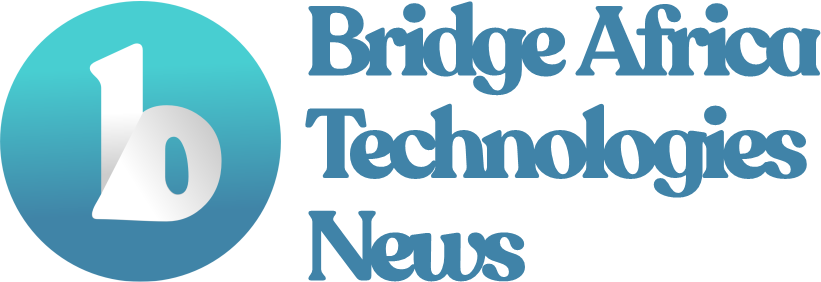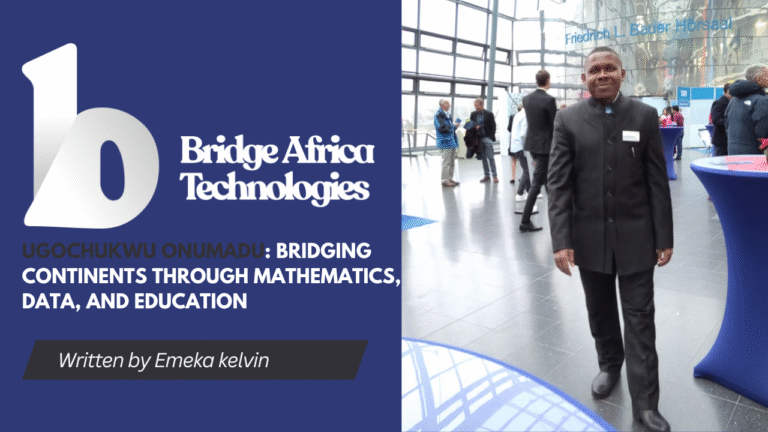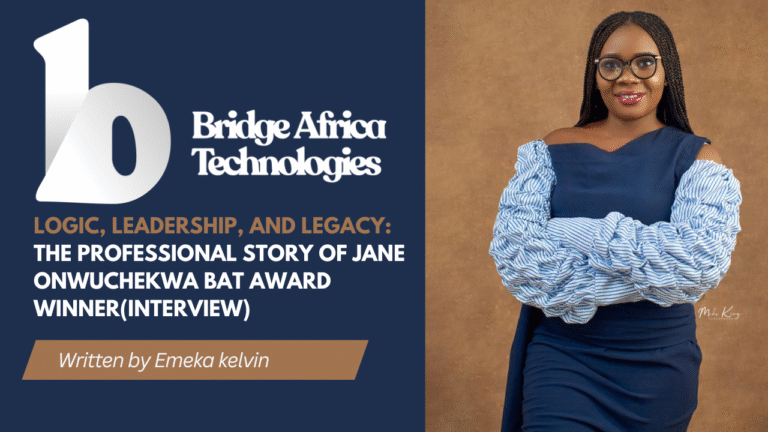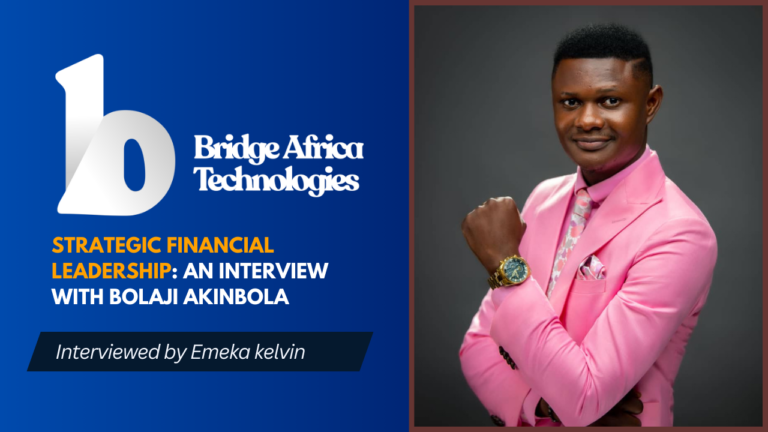“Data is more than numbers; it’s a reflection of lives, systems, and untapped potential. I believe in using it to create solutions that are human-centered and globally relevant. Innovation begins when we listen, learn, and lead with purpose.”— Ms.Chinazom K. Chukwuemeka
Meet Ms. Chinazom Chukwuemeka, a data scientist and AI researcher whose work is redefining how technology intersects with public health, business operations, and municipal planning. With a robust foundation in health informatics, business analytics, and computer information systems, she has carved a distinctive path marked by innovation, impact, and cross-sector influence. Whether improving infectious disease surveillance in Indiana or driving equity plan optimization at Morgan Stanley, Chinazom combines technical expertise with a passion for real-world problem-solving.
Growing up in Nigeria, her early exposure to health crises and digital inequality fueled her interest in using data and machine learning to address systemic issues. From volunteering with the Nigerian Red Cross during the Ebola outbreak to launching digital learning initiatives in underserved schools, her commitment to community empowerment has remained constant. This same drive carried through to her academic journey—earning a Bachelor’s degree in Computer Information Systems from Babcock University, a Master’s in Health Informatics from Indiana University, and another in Business Analytics from the University of Lethbridge in Canada.
Chinazom’s professional career is as multifaceted as her education. Her roles have spanned global institutions like the Indiana Department of Health, the City of Calgary, and Shareworks by Morgan Stanley. At the peak of the COVID-19 pandemic, she developed real-time data solutions that improved public health response times by 40% and reduced the cognitive burden on healthcare workers by over 30%. She has led projects that influence policy development, optimize municipal operations, and boost healthcare efficiency—often using Python, SQL, and advanced analytics to translate complex data into actionable insights.
Her work has earned her widespread recognition, including the prestigious BAT Award of Excellence 2024 in the Data Innovation Excellence category. She has secured over $13,000 in academic and research grants across Alberta and Indiana, including the Alberta Graduate Excellence Award. Her certifications from AWS, Google, and the London School of Business further reflect her commitment to lifelong learning and global standards of excellence.

READ ALSO: BAT Most Influential Women In Tech In Nigeria
Beyond her technical roles, Chinazom is a published researcher, volunteer, and journal peer-reviewer on topics in predictive healthcare analytics and machine learning. She has judged the work of others in areas spanning from accident severity modeling using random forest algorithms to novel frameworks for NoSQL database structuring, highlighting her academic depth and curiosity. She continues to explore the intersection of AI and mental health, currently researching models that detect early signs of PTSD and depression among veterans and young adults using EHR data and natural language processing.
Chinazom’s story is not just about algorithms and dashboards—it is about people. Her work bridges the gap between innovation and impact, blending technical rigor with human empathy. As she looks to the future, her aspiration remains clear: to lead transformative AI-driven projects that improve lives, enable smarter cities, and create healthier communities globally.
Interview with Chinazom Chukwuemeka – Data Scientist, AI Researcher, and Global Health Innovator
1. Chinazom, take us back to the beginning. Growing up in Nigeria, what influenced your early interest in technology, and how did that shape your career path today?
Chinazom: Growing up in Nigeria, I was surrounded by both challenges and resilience. I saw how communities struggled with healthcare access, information gaps, and infrastructure limitations. But even then, I noticed the power technology had—even in small ways—to solve complex problems. I remember being captivated by the way simple digital tools could connect people, disseminate health education, or streamline processes in local businesses. That fascination became a driving force for me. I didn’t just want to use technology—I wanted to use it to create real-world impact. That passion pushed me to pursue a degree in Computer Information Systems at Babcock University, and it’s been the thread connecting all my work since—from volunteering with the Nigerian Red Cross during Ebola to building predictive models that aid public health surveillance in North America.
2. You hold multiple degrees from institutions across Nigeria, the U.S., and Canada. How has your diverse academic background shaped your multidisciplinary approach to data science and public health?
Chinazom: Each academic journey added a unique layer to how I solve problems. At Babcock University, I built my technical foundation—how to design systems, write code, and think logically. At Indiana University, I dove into Health Informatics, which was a perfect bridge between tech and healthcare. That’s where I began to understand the nuances of health data, interoperability, patient privacy, and decision-making in clinical settings. Then, at the University of Lethbridge in Canada, I studied Business Analytics, which added the lens of strategy, economics, and leadership to my technical toolkit. Now, when I look at a dataset, I don’t just see numbers—I see lives, systems, and potential improvements. I ask: how can this help a patient, a policymaker, or a business leader make more informed decisions?
3. You were recently honored with the 2024 BAT Award of Excellence for Data Innovation. What does this recognition mean to you, and how does it reflect the work you’ve been doing?
Chinazom: The BAT Award of Excellence was incredibly meaningful to me—not just because it was an honor, but because it was a recognition of years of hard work across continents. For me, it validated that the work I do in healthcare analytics, municipal policy, and business transformation is not only technically sound but also impactful. It celebrated the fact that innovation isn’t just about new tools—it’s about using data to make better decisions, reduce suffering, and create more efficient systems. It also reminded me of my roots. As a Nigerian woman working globally, that recognition felt like a bridge between home and abroad—proof that innovation can come from anywhere and reach everywhere.
4. During the COVID-19 pandemic, you played multiple roles at the Indiana Department of Health. Can you share what that experience taught you about data in crises?
Chinazom: The pandemic was an intense period—professionally and emotionally. I served as a trauma registry coordinator, then got promoted to a data analyst, and also volunteered in frontline communications. One key lesson was the critical importance of timely, accurate data. In crises, data isn’t just a resource—it’s a lifeline. I developed Python-based scripts for real-time variant tracking, automated dashboards for public health reporting, and streamlined ETL processes for millions of lab records. I also worked on dashboards that reduced the cognitive overload on frontline healthcare workers, which improved mental health outcomes and operational efficiency. It was a crash course on resilience and adaptability. Every line of code, every dataset cleaned—it all had immediate consequences, and that sense of urgency sharpened my skills tremendously.
5. From working with Morgan Stanley to influencing policy at the City of Calgary, your work spans both corporate and public sectors. How do you navigate these different environments as a data scientist?
Chinazom: That’s a great question. Navigating both worlds requires not just technical agility, but also emotional intelligence and contextual awareness. In the public sector, especially during my time at the City of Calgary, the focus was long-term impact—how data can help plan for the future, support urban resilience, or influence health equity. In the corporate world, like at Morgan Stanley, the emphasis is often on operational efficiency, risk management, and real-time decision-making while small start-ups place additional emphasis on viability. But the thread that connects both is storytelling through data. I’ve learned to speak the language of clinicians, city planners, business leaders, and engineers alike. Whether it’s building Tableau dashboards for executive strategy or conducting stakeholder interviews for futures research, my goal is the same: turn data into action.
6. You’ve received over $13,000 in excellence awards and fellowships, and you hold multiple certifications. How have these milestones shaped your journey, and what keeps you motivated to keep learning?
Chinazom: Each award and certification is a reflection of a milestone—an obstacle overcome, a project delivered, or a concept mastered. The Alberta Graduate Excellence Award, the Peter & Helen Kelley Scholarship, and the Work-Integrated Learning Placement Award weren’t just financial boosts; they were reminders that people believed in the value of my work. My certifications from AWS, Google, Scrum Alliance, and the London School of Business keep me sharp and relevant, especially in a field as fast-evolving as data science. But what truly keeps me going is my why—the belief that data, when harnessed ethically and intelligently, can solve some of the world’s toughest problems. That belief fuels my hunger to keep learning and contributing.
7. As a Nigerian making global strides in health and data science, what message do you have for young Africans aspiring to make an impact internationally?
Chinazom: My message is simple: your roots are not your limits—they are your strength. Coming from Nigeria, I understand what it means to navigate systems that weren’t always built for you. But that’s also where your resilience, creativity, and resourcefulness come from. Don’t be afraid to dream globally while thinking locally. Build your skillset, seek mentorship, stay curious, and above all, let your impact speak louder than your passport. The world is more interconnected than ever, and there’s a seat at the table for African innovators—especially in healthcare, climate, governance, and tech. We just have to claim it.
8. Finally, what are you currently working on, and what are your aspirations for the future in terms of innovation and impact?
Chinazom: Right now, I’m focused on research that uses natural language processing and machine learning to detect early signs of mental health issues—particularly PTSD and depression—by analyzing electronic health records and social determinants of health. It’s a deeply human project that combines my passion for tech, empathy, and public service. My experience on the trauma injury prevention and COVID response teams laid the groundwork for this endeavor. Looking ahead, I want to lead cross-disciplinary teams tackling global health inequities, especially in under-resourced communities. I’m also passionate about mentoring the next generation of data professionals, particularly women and Africans in STEM. My long-term goal is to establish a data-driven innovation lab that partners with public health agencies across Africa to create scalable, tech-enabled solutions. It’s not just about innovation—it’s about inclusive innovation.
Closing Statement – Interview with Chinazom Chukwuemeka
As we draw the curtain on this insightful conversation with Ms. Chinazom, one thing is unmistakably clear—she is not just navigating the world of data science; she is shaping it. From her early beginnings in Nigeria, where she first witnessed technology’s power to transform lives, to her impactful work in North America spanning public health, municipal governance, and corporate strategy, Chinazom exemplifies what it means to be both purpose-driven and globally relevant.
Throughout our discussion, she spoke candidly about her multidisciplinary journey—from earning degrees in Computer Information Systems, Health Informatics, and Business Analytics, to leading data-driven innovations in healthcare systems and city planning. Her experience during the COVID-19 pandemic, her influential role at Morgan Stanley, and her research on mental health analytics show a rare blend of technical rigor and human empathy.
What stands out even more is her heart for service—whether through volunteering with the Nigerian Red Cross during the Ebola crisis, organizing digital access initiatives for underserved communities, or championing data equity in policy making. Recognized with the 2024 BAT Award of Excellence for Data Innovation, Chinazom is a shining example of how talent rooted in Africa can flourish on a global stage while still remaining connected to community impact.
At Bridge Africa Technologies, we are proud to spotlight exceptional Nigerians like Chinazom who are breaking barriers, challenging norms, and creating a legacy of excellence. Her story reminds us that success is not defined by where you start, but by how deeply you remain committed to solving real problems with courage, integrity, and skill.
To every young Nigerian aspiring to make a difference—Chinazom’s journey is proof that the world needs your voice, your ideas, and your tenacity. Whether you’re coding from a small room in Lagos or attending your first health-tech workshop in Jos, your dreams are valid, and your work can reach the world.
Chinazom, thank you for sharing your remarkable journey. We celebrate you—not just for what you’ve achieved—but for the lives you continue to impact. Your story is not just inspiring—it’s a call to action.




